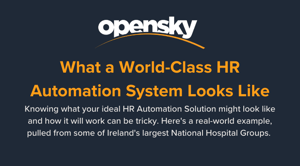Information Intelligence Spotlight
In conversation with Philip Schenck, Information Intelligence Lead at OpenSky.
The level of service and standards within a data project itself can be dependent on the people who are working on the project and how they deal with data migration, data cleansing or managing data.
Philip explained, "The purpose and goals of the Information Intelligence Practice is to develop best practices to provide customers with a standard offering of service relating to data, enabling sharper and more efficient operations. For our customers, they benefit from better costs, improved reporting and a more consistent service."
The Information Intelligence Practice works closely with specialists such as, Business Analysts (BA), Business Intelligence (BI), BI & Data Consultants, QA Testers, QA Leads, and .Net Developers who collaborate and share their expertise to achieve project success.
A key part of Philip’s role is to standardise data migration, but he must also be aware of the future innovations and pay attention to anything related to data; data cleansing, and data migration etc. Evolving technologies remain a key priority with a particular focus (at the moment) on Machine Learning (ML) and Artificial Intelligence (AI). Philip said, “Taking the effort from the human element of a process and moving it into an AI or ML space, allows the customer to be more productive.”
Intelligent Analytics will be the future, with the capability to ask Power BI to write normal language with a breakdown and visualisation of the data. Or using voice recognition and verbally asking, “show me the sales for the last few months,” all of which is driven by AI – cloud services. Of course, this sets OpenSky up for another challenge – getting more customers comfortable with securing data on the cloud and moving away from on-premise.
During a recent Technology & Innovation meeting, led by Commercial & Technology Director, William Flanagan. William and OpenSky's Practice Leads, Roman Kwiatkowski and Philip Schenck presented on their respective practice specialities, highlighting goals & activities they are working on.
Philip showed attendees one example of Intelligent Document Processing (Machine Learning), which reduced/replaced the human element and effort in data entry and capturing of data from paper-based forms/applications. The robust IDP solution increased productivity and reduced costs significantly compared to the cost of human processing costs (i.e. approx 12k V 3k for the processing of 15,000 documents), while improving data integrity.
In the coming months, OpenSky will keep you updated on the Intelligent Information Practice activities.


